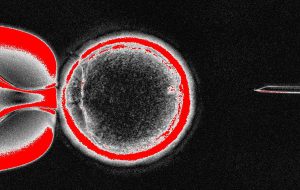By adding caffeine to egg cells, scientists have finally succeeded in using cloning to create human embryonic stem cells, a step toward creating replacement tissue to treat diseases.

Researchers at Oregon Health & Science University in Portland, in a study led by Dr. Shoukhrat Mitalipov and reported in the journal Cell, created embryonic stem cells using somatic cell nuclear transfer, which involves taking DNA from skin cells and inserting it into donated human egg cells. The resulting stem cells thrived and could then be turned into a variety of cell and tissue types, including heart cells and pancreatic tissue. The implications for the repair of tissue damage and treatment of disease entities, for example, repairing heart damage and overcoming the causes of diabetes, are truly astonishing.
According to the published report, caffeine was the added factor that gave the cells the boost they needed to remodel the donor DNA into embryonic cells!
Dr. Mitalipov explained that the stem cells his team created were able to convert themselves “into several different cell types, including nerve cells, liver cells and heart cells,” just like normal stem cells.
“If embryonic stem cells can be made from adults like us, that would mean we could make replacements for any type of cells we would need,” said Dieter Egli, senior research fellow at the New York Stem Cell Foundation Research Institute.
The limitation of earlier efforts involved the difficulty in removing the egg cell’s nucleus. Incredibly, adding caffeine turned out to be an important step in solving the problem this time around.
As we have said before, caffeine is the closest thing to a panacea, offering protections from and treatments for a remarkable number of disease entities. Opening up the possibility of cloning tissue is just the latest of these virtually miraculous health benefits. This new development underscores the so-far neglected avenue of studying how caffeine might be modified to multiply the health benefits of the drug as it occurs in nature.



